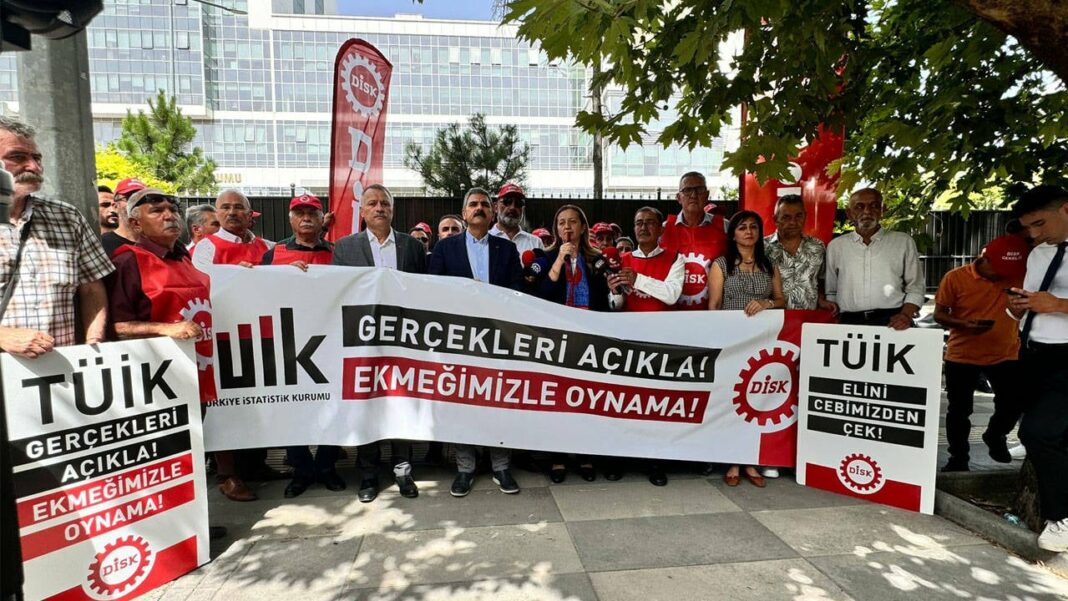The Confederation of Progressive Trade Unions (DİSK) gathered outside the Turkish Statistical Institute (TurkStat) in Ankara on Monday to protest the latest inflation data, claiming that the figures do not reflect the real economic challenges faced by Turkish citizens.
DİSK Chairwoman Arzu Çerkezoğlu led the demonstration, highlighting the discrepancy between official inflation statistics and the daily realities experienced by the public.
“We know that the inflation felt by the people is far from what is being reported. The real inflation is experienced every day by the 85 million people living in this country,” Çerkezoğlu said.
According to TurkStat, the rate of inflation for June was reported at 1.64 percent, with an annual rate of 71.60 percent. The six-month inflation rate was calculated at 24.73 percent. However, DİSK argues that these figures fail to capture the real increases in the cost of living.
Disparity in food inflation
Çerkezoğlu criticized the official data, noting that food inflation alone, which disproportionately affects low-income families, was reported at 68.08 percent. DİSK-AR, the research arm of DİSK, used TurkStat’s data to analyze food inflation across different income groups, revealing significant disparities. The findings indicated that the poorest 20 percent experienced food inflation at 121 percent, while the wealthiest 20 percent faced only 47.9 percent.
“This discrepancy shows that the inflation experienced by different income groups varies greatly. The official average inflation rates do not represent the reality for low-income earners and workers,” Çerkezoğlu said.
Call for frequent minimum wage increases
In response to the persistently high inflation, DİSK is advocating quarterly adjustments to the minimum wage until inflation is reduced to single digits. The current minimum wage of 17,002 Turkish lira is already below the hunger threshold of 18,980 lira, as calculated by the Confederation of Turkish Trade Unions (TÜRK-İŞ).
The hunger threshold, which is defined as the amount of money that a family of four living in the capital city of Ankara needs to spend for healthy and balanced nourishment, was TL 18,980 ($580) in June, nearly TL 2,000 above the minimum wage of TL 17,002, according to data from the TÜRK-İŞ.
“More than half of Turkey’s workforce is condemned to earn the minimum wage, which is being eroded by inflation,” Çerkezoğlu stated. “We are calling for the government to implement wage increases four times a year to help workers cope with the rising cost of living.”
Government’s stance on wage increases
Despite these calls, Labor Minister Vedat Işıkhan ruled out an interim increase in the minimum wage for the second half of 2024, maintaining the government’s position that frequent wage hikes could exacerbate inflation.
Finance Minister Mehmet Şimşek also sparked controversy by claiming that Turkey’s minimum wage is the highest among developing countries, a statement met with skepticism from labor groups.
DİSK argues that the government’s approach to controlling inflation through tight fiscal policies, which include limiting wage increases, disproportionately impacts low-income earners. The union contends that inflation is driven by factors other than wage increases and that reducing purchasing power is not a viable solution.
Impact on workers and retirees
The recent data released by TurkStat also determines the rate of increase in wages and pensions. With the six-month inflation rate at 24.73 percent, public sector employees and retirees will receive a 19.31 percent rise, while retirees will see a 24.73 percent increase in their pensions.
However, critics argue that these increases are insufficient for keeping up with the actual rise in living costs. Experts point out that even with the official inflation figures, wages have effectively decreased, leaving millions of workers, civil servants and retirees struggling to make ends meet.
Opposition leaders have also weighed in on the issue. Özgür Özel, leader of the Republican People’s Party (CHP), criticized the government’s handling of the economy during a press conference.
“There are no elections, so there are no increases in the minimum wage. The minimum wage, which was 17,000 lira at the beginning of the year, is now equivalent to [what] 13,000 lira [was worth in January],” he said, emphasizing that the government’s reluctance to raise wages amid high inflation is untenable.
Özel further highlighted the disconnect between official policy and public sentiment. “We make our calculations based on the people’s needs. If you don’t raise the minimum wage, there will be no livelihood [for the people], and there will be elections. It’s not me who’s saying this; the crowds are clamoring for elections,” he said, noting that public demand for early elections is growing due to economic hardships.
Müsavat Dervişoğlu, leader of the nationalist opposition Good (İYİ) Party, also addressed the economic crisis at his party’s group meeting in parliament.
“As long as this administration remains in power, neither will prices drop nor will the purchasing power of our people improve,” he said. Criticizing Finance Minister Şimşek, Dervişoğlu added, “With someone like Mehmet Şimşek, who behaves like an agent of foreign creditors, it’s clear that any temporary improvements will be followed by even harsher economic conditions.”
